Zero Angel Richardson's Blog, page 5
March 28, 2016
You get what you put in: Or, why is the "average" teacher not a good teacher?
People tend to complain about how there aren't good math teachers.
As I see it, there a few reasons why, in general at least, this is true—yes, I am one of the people saying there aren't many good teachers. There are obvious exceptions of course, but there are so many not good teachers that every student encounters them on a semi-regular basis. And really, I'll be assuming that teachers have good intentions and have the base level of talent required to teach that can't be taught. Not all teachers have both of those, so everything I'm about to say is skewed up, and it's actually even worse than I am presenting it.
I'll only be talking about math of course, but I think my points apply globally to all subjects.
Before we get started, I am not a good teacher. Don't get me wrong, I am arrogant enough to believe I am a fantastic lecturer or explainer—I usually assume I'm the best at explaining—and that's usually enough for me to get a significant portion of students to claim I am the best math teacher they've ever had, but I am definitely not a great teacher, so if I am the "best they've ever had", then what does that say about everyone else they've ever had?
(1) Teachers aren't trained appropriately. They need to be able to regurgitate a base level of education training and mathematical training without any sort of conceptual understanding being demonstrated in order to get teaching certificates.
You might hem and haw, but this is a fact. If you're able to do the material that you expect students to learn at around 80% ability, then you can probably get a teaching certificate with the appropriate degree.
(2) Teachers aren't compensated appropriately financially. At least not nationwide, there are definite exceptions to this on a state-by-state or even district-by-district basis, but in terms of the amount of work and training that goes into teaching well compared with the amount of compensation teachers receive, there's usually a pretty big discrepancy. This is frequently why a lot of people go into teaching because it's what they want to do, but are forced to find other work because they can't support themselves on teaching salaries.
(3) There's not enough time in the day. Especially at the secondary levels, I think this has a LOT to do with good teachers. I believe there are probably many people currently teaching that are CAPABLE of teaching well, but we're talking about planning out 6 hours of quality education every weekday, assessing and grading all of that work. There are many resources, and there is frequently the ability to re-use past years of work as long as the text or curriculum hasn't changed, but to have quality education, it's straight-up time consuming. Then you add that to that #2 and it's just not worth killing yourself over it unless you're doing it as a public service and not just a career.
(4) Teachers aren't compensated appropriately psychologically or emotionally. If a teacher is hard and you have to learn a lot, they're usually one of the least recommended and least liked teachers by a majority. Now, there's the minority of people that go to school wanting to learn, and those students gravitate to those teachers, but the harder a teacher tries and the more effective a teacher is with their assessments, then the more likely it is that students are NOT going to respond well to that.
Imagine you have a teacher that is well-trained, doesn't worry about finances and kills themselves burning the candle at both ends creating quality education both in and out of class. Then the students that appreciate you go on their way and maybe tell others how wonderful you are or if you are in a university setting try to take you for multiple classes, but most students you never hear from again. Those teachers hear about the problems students have with them time and time again however.
Personally, I have a very difficult time with criticism to be honest. I don't know what exactly it is, but no matter how many students profess to have had their lives changed by me, or say that I am the best math teacher they've ever had, or recommend me to other students who then tell me about the recommendation, or go and tell the people that work in the math department, or write glowing reviews in the anonymous semesterly reviews...no matter how many instances of great reviews there are and no matter how trivial the criticism, it still affects me to be criticized negatively.
Even when I know I'm completely right and that I have an awesome day or class or semester, when there are 20 reviews telling me how amazing the class is, 15 reviews telling me the class is fine and 2 reviews telling me that I'm terrible. It's the 2 that I am going to remember.
I don't even read my reviews now because it's not productive for me anymore. The last semester I read them I had something like 100 reviews and out of those 100 there were only 2 reviews that had anything negative to say. Guess which ones affected me the most?
Here's the thing with teaching, at least how I see it. When you put forth time into trying to help others, it is almost impossible to not care about them. Unless you're able to just completely detach yourself from what you're doing, then you're going to care.
And if you care, then you're not going to have too many instances where there is any feedback whatsoever going into that caring and chances are if there is feedback of any nature, it's only going to be negative. So you learn to cherish the positive and let go of the negative because you're perfect and this is a Disney show where you're somehow able to do that, right?
But chances are that you're probably going to start detaching yourself from the students or burn out and change careers. You're not going to make their victories your victories or their failures your failures. You're going to go to work, put in the minimal amount of effort, reuse someone else's work and assessment, stop awarding partial credit, stop encouraging or even valuing participation, get your paycheck and go home.
It's a definite cognitive dissonance situation. If you were paid well enough to put up with that bullshit, then maybe you could manage being awesome without being hurt. If the job was easy enough that the pay didn't seem like a slap in the face and you could go up there and just present without having to worry about engagement and correctness and everything else, then it wouldn't matter what you're presenting.
But the job isn't easy and you're not paid well, and it does matter what you present.
Teachers that want to do a good job are beaten down financially, emotionally, and physically, and then have to rely on the teachers they had in school and university levels to provide them with the training necessary to be capable of being a good teacher. I'm amazed by teachers that are able to overcome the first three, but even they still have that last hurdle that's more than anything else a matter of luck. And it's also split into two parts: are they well trained in the education part AND the subject specific concepts? or just one?
So why is the "average" teacher not a good teacher? Because you get what you put in. If you increased the financial incentives, there would be more talent attracted to the market and more competitiveness for positions; if you decreased the physical toll and reduced the number of hours teaching and increased the number of hours of prep, teachers wouldn't get burned out from lack of sleep and would have more time to plan projects, assignments and be willing to grade them; if you thanked your teacher and let them know they made a difference in your life and every once in a while (can be years or just when you randomly think of it) dropped them a letter or email thanking them or reminding them of the difference they made with you, then they'd be more driven to have the motivation to be a good teacher; and finally, if you offered training that made sense and taught the subject the way it should be taught and not the way it's always been taught, then you'd have teachers that were capable of being good teachers if the will and motivation were there.
But if you're a teacher in America, chances are you're not paid well; it's surprising to hear from past students, let alone something positive; you end up reducing the amount you teach in class to try to save your body so that you have time to sleep and get the papers graded; when you get behind you give free days or study hall days or you fall ill because your immune system is damaged from not sleeping (or you assign work straight from the book, teach straight from the book, and use hastily constructed multiple choice assessments); and finally, you've been a product of a system that's been like this for a long, long time.
68% of the teachers you're learning from have been "average" teachers and an average teacher isn't a good teacher.
Are the 16% of teachers that are above average enough to inspire you to greatness or to buck the trend yourself? Or are the 16% of teachers below average enough to make you swear off the subject entirely or at the very least, develop some deep-rooted inaccuracies in your understanding of the material?
As I see it, there a few reasons why, in general at least, this is true—yes, I am one of the people saying there aren't many good teachers. There are obvious exceptions of course, but there are so many not good teachers that every student encounters them on a semi-regular basis. And really, I'll be assuming that teachers have good intentions and have the base level of talent required to teach that can't be taught. Not all teachers have both of those, so everything I'm about to say is skewed up, and it's actually even worse than I am presenting it.
I'll only be talking about math of course, but I think my points apply globally to all subjects.
Before we get started, I am not a good teacher. Don't get me wrong, I am arrogant enough to believe I am a fantastic lecturer or explainer—I usually assume I'm the best at explaining—and that's usually enough for me to get a significant portion of students to claim I am the best math teacher they've ever had, but I am definitely not a great teacher, so if I am the "best they've ever had", then what does that say about everyone else they've ever had?
(1) Teachers aren't trained appropriately. They need to be able to regurgitate a base level of education training and mathematical training without any sort of conceptual understanding being demonstrated in order to get teaching certificates.
You might hem and haw, but this is a fact. If you're able to do the material that you expect students to learn at around 80% ability, then you can probably get a teaching certificate with the appropriate degree.
(2) Teachers aren't compensated appropriately financially. At least not nationwide, there are definite exceptions to this on a state-by-state or even district-by-district basis, but in terms of the amount of work and training that goes into teaching well compared with the amount of compensation teachers receive, there's usually a pretty big discrepancy. This is frequently why a lot of people go into teaching because it's what they want to do, but are forced to find other work because they can't support themselves on teaching salaries.
(3) There's not enough time in the day. Especially at the secondary levels, I think this has a LOT to do with good teachers. I believe there are probably many people currently teaching that are CAPABLE of teaching well, but we're talking about planning out 6 hours of quality education every weekday, assessing and grading all of that work. There are many resources, and there is frequently the ability to re-use past years of work as long as the text or curriculum hasn't changed, but to have quality education, it's straight-up time consuming. Then you add that to that #2 and it's just not worth killing yourself over it unless you're doing it as a public service and not just a career.
(4) Teachers aren't compensated appropriately psychologically or emotionally. If a teacher is hard and you have to learn a lot, they're usually one of the least recommended and least liked teachers by a majority. Now, there's the minority of people that go to school wanting to learn, and those students gravitate to those teachers, but the harder a teacher tries and the more effective a teacher is with their assessments, then the more likely it is that students are NOT going to respond well to that.
Imagine you have a teacher that is well-trained, doesn't worry about finances and kills themselves burning the candle at both ends creating quality education both in and out of class. Then the students that appreciate you go on their way and maybe tell others how wonderful you are or if you are in a university setting try to take you for multiple classes, but most students you never hear from again. Those teachers hear about the problems students have with them time and time again however.
Personally, I have a very difficult time with criticism to be honest. I don't know what exactly it is, but no matter how many students profess to have had their lives changed by me, or say that I am the best math teacher they've ever had, or recommend me to other students who then tell me about the recommendation, or go and tell the people that work in the math department, or write glowing reviews in the anonymous semesterly reviews...no matter how many instances of great reviews there are and no matter how trivial the criticism, it still affects me to be criticized negatively.
Even when I know I'm completely right and that I have an awesome day or class or semester, when there are 20 reviews telling me how amazing the class is, 15 reviews telling me the class is fine and 2 reviews telling me that I'm terrible. It's the 2 that I am going to remember.
I don't even read my reviews now because it's not productive for me anymore. The last semester I read them I had something like 100 reviews and out of those 100 there were only 2 reviews that had anything negative to say. Guess which ones affected me the most?
Here's the thing with teaching, at least how I see it. When you put forth time into trying to help others, it is almost impossible to not care about them. Unless you're able to just completely detach yourself from what you're doing, then you're going to care.
And if you care, then you're not going to have too many instances where there is any feedback whatsoever going into that caring and chances are if there is feedback of any nature, it's only going to be negative. So you learn to cherish the positive and let go of the negative because you're perfect and this is a Disney show where you're somehow able to do that, right?
But chances are that you're probably going to start detaching yourself from the students or burn out and change careers. You're not going to make their victories your victories or their failures your failures. You're going to go to work, put in the minimal amount of effort, reuse someone else's work and assessment, stop awarding partial credit, stop encouraging or even valuing participation, get your paycheck and go home.
It's a definite cognitive dissonance situation. If you were paid well enough to put up with that bullshit, then maybe you could manage being awesome without being hurt. If the job was easy enough that the pay didn't seem like a slap in the face and you could go up there and just present without having to worry about engagement and correctness and everything else, then it wouldn't matter what you're presenting.
But the job isn't easy and you're not paid well, and it does matter what you present.
Teachers that want to do a good job are beaten down financially, emotionally, and physically, and then have to rely on the teachers they had in school and university levels to provide them with the training necessary to be capable of being a good teacher. I'm amazed by teachers that are able to overcome the first three, but even they still have that last hurdle that's more than anything else a matter of luck. And it's also split into two parts: are they well trained in the education part AND the subject specific concepts? or just one?
So why is the "average" teacher not a good teacher? Because you get what you put in. If you increased the financial incentives, there would be more talent attracted to the market and more competitiveness for positions; if you decreased the physical toll and reduced the number of hours teaching and increased the number of hours of prep, teachers wouldn't get burned out from lack of sleep and would have more time to plan projects, assignments and be willing to grade them; if you thanked your teacher and let them know they made a difference in your life and every once in a while (can be years or just when you randomly think of it) dropped them a letter or email thanking them or reminding them of the difference they made with you, then they'd be more driven to have the motivation to be a good teacher; and finally, if you offered training that made sense and taught the subject the way it should be taught and not the way it's always been taught, then you'd have teachers that were capable of being good teachers if the will and motivation were there.
But if you're a teacher in America, chances are you're not paid well; it's surprising to hear from past students, let alone something positive; you end up reducing the amount you teach in class to try to save your body so that you have time to sleep and get the papers graded; when you get behind you give free days or study hall days or you fall ill because your immune system is damaged from not sleeping (or you assign work straight from the book, teach straight from the book, and use hastily constructed multiple choice assessments); and finally, you've been a product of a system that's been like this for a long, long time.
68% of the teachers you're learning from have been "average" teachers and an average teacher isn't a good teacher.
Are the 16% of teachers that are above average enough to inspire you to greatness or to buck the trend yourself? Or are the 16% of teachers below average enough to make you swear off the subject entirely or at the very least, develop some deep-rooted inaccuracies in your understanding of the material?
Published on March 28, 2016 18:23
March 26, 2016
On the Importance of Rigor in Mathematics Illustrated with How to Teach Absolute Value Algebraically
(ick, could we get a little more SEO-y with that title?)
Maybe you're like me and always heard of "new math" as some horrible misstep America made in the 1960s; or maybe you've bought into the ads against what people are saying about the current curriculum trying to meet the Common Core Standards.
I'd like to think that Common Core addresses many of the drawbacks of "New Math", but it definitely isn't doing much better in the zeitgeist than New Math did, and a HUGE part of that is having teachers that aren't trained in the mathematics they're expected to teach.
Having teachers that aren't able to balance educational heuristic techniques, definitions, and explanations with more rigorous ones is definitely an issue that needs to be addressed within each individual curriculum based on CCSS. You can't go the way we've all heard New Math went and just throw college-level definitions at students right off the bat (maybe if they're adults that are interested in their education, but even then the heuristic explanations should be included as well).
But you also can't do what teachers have seemingly always done: either completely ignore the actual definitions of mathematical objects and rely on incorrect definitions and arcane rules or include the definitions only as something to be memorized or as an aside with no relevance.
We have rigor in mathematics for a reason, and if we didn't need it or if it wasn't useful, we wouldn't have it. That's how math works. (That's one of the reasons why I will argue that 0^0=1 any time we need it to be and that a parallelogram is also a trapezoid).
Rigor is both needed *and* useful.
I've written more about this, but don't want to mess with the math formatting, so please follow the link below for a pdf illustrating my argument through the context of absolute value of a number. Don't forget to come back and comment/+1/share when you're done. (Note: if you are came here just to get help on learning how to solve absolute value equations and absolute value inequalities, the "teaching" portion of the essay starts on page 5, but the article is primarily about rigor and teaching strategies).
On the Usefulness of Rigor in Teaching Mathematics as Illustrated with Absolute Value
I hope this explains how you were probably taught absolute value and why you were taught that way, what we can do with the definitions if they are given to us, and the importance of teaching rigorous definitions in mathematics. If you have any questions, please comment below. Thank you!
Maybe you're like me and always heard of "new math" as some horrible misstep America made in the 1960s; or maybe you've bought into the ads against what people are saying about the current curriculum trying to meet the Common Core Standards.
I'd like to think that Common Core addresses many of the drawbacks of "New Math", but it definitely isn't doing much better in the zeitgeist than New Math did, and a HUGE part of that is having teachers that aren't trained in the mathematics they're expected to teach.
Having teachers that aren't able to balance educational heuristic techniques, definitions, and explanations with more rigorous ones is definitely an issue that needs to be addressed within each individual curriculum based on CCSS. You can't go the way we've all heard New Math went and just throw college-level definitions at students right off the bat (maybe if they're adults that are interested in their education, but even then the heuristic explanations should be included as well).
But you also can't do what teachers have seemingly always done: either completely ignore the actual definitions of mathematical objects and rely on incorrect definitions and arcane rules or include the definitions only as something to be memorized or as an aside with no relevance.
We have rigor in mathematics for a reason, and if we didn't need it or if it wasn't useful, we wouldn't have it. That's how math works. (That's one of the reasons why I will argue that 0^0=1 any time we need it to be and that a parallelogram is also a trapezoid).
Rigor is both needed *and* useful.
I've written more about this, but don't want to mess with the math formatting, so please follow the link below for a pdf illustrating my argument through the context of absolute value of a number. Don't forget to come back and comment/+1/share when you're done. (Note: if you are came here just to get help on learning how to solve absolute value equations and absolute value inequalities, the "teaching" portion of the essay starts on page 5, but the article is primarily about rigor and teaching strategies).
On the Usefulness of Rigor in Teaching Mathematics as Illustrated with Absolute Value
I hope this explains how you were probably taught absolute value and why you were taught that way, what we can do with the definitions if they are given to us, and the importance of teaching rigorous definitions in mathematics. If you have any questions, please comment below. Thank you!
Published on March 26, 2016 12:42
March 24, 2016
The Problem with DC
As are most people in the world, I'm a lifelong fan of Superman and Batman. As I grew and experienced more of the DC universe, I came to love many of the characters inhabiting its space. So it hurts me to think about the DC universe usually, because it seems to be inherently flawed.
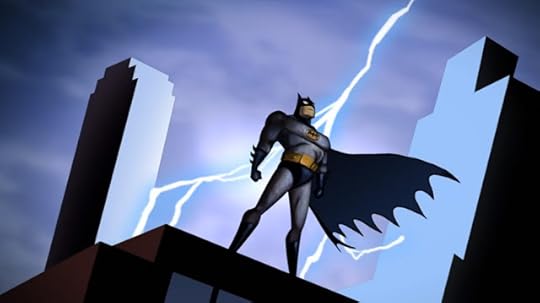
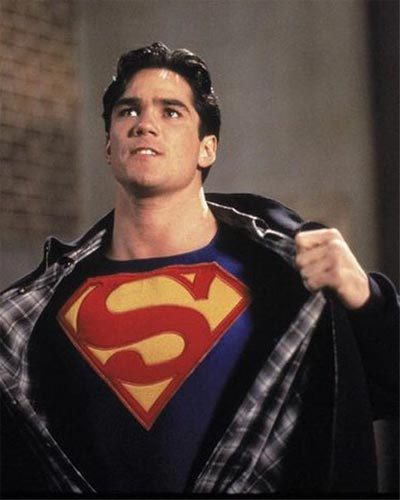

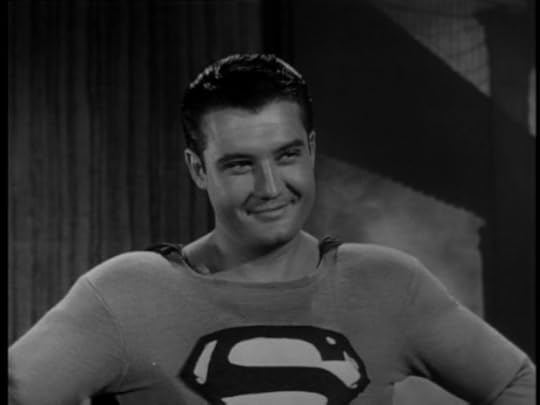 In order to have a cinematic DC universe, the only option has always been to jumpstart it all at once. Man of Steel was nothing more than a toe test for the water. If they were to bring in the universe proper, it would have to be all at once or none at all.
In order to have a cinematic DC universe, the only option has always been to jumpstart it all at once. Man of Steel was nothing more than a toe test for the water. If they were to bring in the universe proper, it would have to be all at once or none at all.
That's because that's how the DC universe is set up. An absurd amount of characters, both villains and heroes, with literally world-shaking events at a near constant rate. If you are going to open it up at all, nearly every story that spans more than a single geographic area is going to affect the entire world, if not the entire dimension, so if these other characters are already existing, but in the background, then they will show up in any consistent universe.
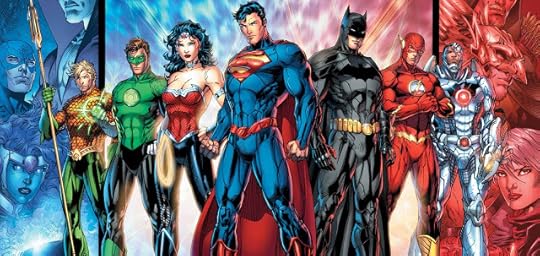
Any reasonable attempt so far to portray the DC universe on film has been so limiting as to be almost unrecognizable. As mentioned earlier, DC has world-shaking events at a near constant rate. I recently watched the first season of Young Justice and in one episode they were stopping an already erupting supervolcano (one of the regularly cited "end of humanity" events) and in another they prevented a black hole from forming (that had already started to suck in mass and rotate). This is a show about a team of superheroes that go in under the radar. In another episode, all major cities in the world were under attack by gas-spewing, regenerating supermassive plants.
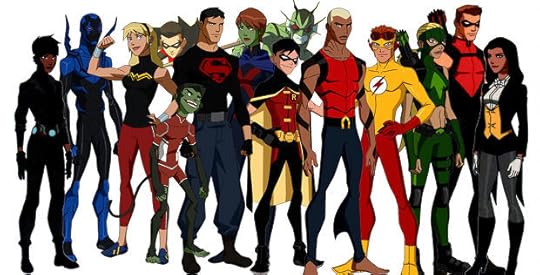
I can see DC fans cheering for the terraforming mech in Man of Steel because that's the type of event that happens regularly in DC proper. I was left underwhelmed. It seemed like nothing but bloat, and an absurd escalation to an already world-changing event (alien super-powered army invasion wasn't enough). And that's ignoring the illogical choice to terraform Earth to be more like Krypton anyway (Kryptonians are super-powerful on Earth, why would they want to do anything to make things more like Krypton?).
The destruction of Metropolis in Man of Steel maybe isn't expected, but it's par for the course in a normal DC storyline.
The DC universe is so bloated, so incredible, that it lacks credibility on the screen. If it's represented in cinematic form the way it's presented in comics and many animation, then you're left watching an, "oh, that's cool looking" movie and that's it.
One of the reasons why Young Justice season 1 is involving and interesting is that the characters all go through some pretty interesting arcs, have emotional depth, have complex relationships, and feel like real people. It also helps that they aren't so absurdly overpowered as to require Darkseid or Doomsday to pose a challenge.
In general, you can boil down the characters in the DC universe to three-dimensional characters. There's so much backlog for them all that any halfway decent writer can do that. But they can't do that with the spectacle that is the DC universe proper.
How can you care about the struggle a character has to go through emotionally when literally in the next scene they are flying through the center of the planet or running faster than the speed of light?
I've always heard that DC has better stories and Marvel has better characters. I don't think that's true on either side. I think DC has more spectacle and Marvel has more character development.
They're both soap operas at the end of the day, but when translating those soaps to the big screen, character struggle with high stakes is 1000% more engrossing than big, bloated set pieces that aren't properly built up.
I get pretty tired hearing pundits implying that in order to do a DC cinematic universe it has to be done all at once. Their reasons are never stated as being in-universe reasons, but rather so WB can start to compete with Disney/Marvel on a financial stage. What? Are movies a zero-sum game? Can only one superhero movie studio do well per year? This is absurd, and it's the kind of thinking that sunk Spider-Man 3, Amazing Spider-Man 2, and Fantastic Four.
It's hard not to compare the different franchises, but let's discuss some things. First, when one of the main characters in the Marvel Studios Cinematic Universe (MCU) feels something or has a backstory or anything like that, guess what, we've all seen those things and can feel those things. They've been set-up. Arguably one of the best parts of the last trailer is Cap saying, "I could do this all day," because it's such a call-back to the first Cap film. This is 5 years of set-up for that one line. It was perfect.
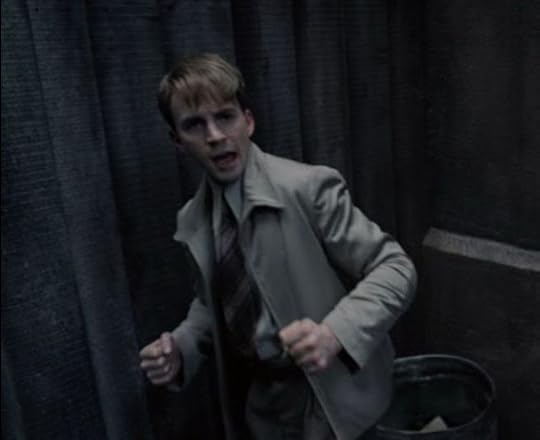
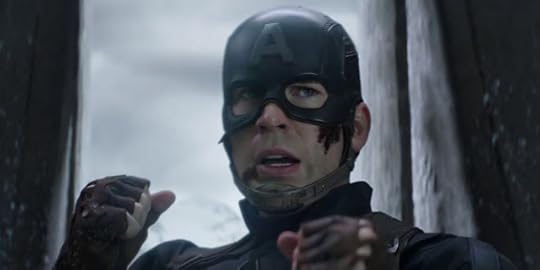
In the newly rebooted X-Men franchise, the struggle between Magneto and Xavier and how Mystique is affected has never been clearer or better shown. In the first version of these movies, we relied on communal understanding of the characters and they still showed the struggle, but we didn't feel it as viscerally as we feel it now between these three. There's internal logic to the decisions the characters make.
For Deadpool, it's absurd and it's designed to be absurd, but we got an origin story anyway. It reset the origin from X-Men Origins for the character and now we all have a new understanding of the character. Deadpool is arguably one of the characters that could get away without explaining anything because more than an action superhero movie, it's a comedy. It has the other parts too, but the goal of the entire thing is sheer fun.
Maybe I take the storyline and characters too seriously for non-absurdist stories that are supposed to be good stories. I can't turn off my brain when I watch these characters because I care too much about them. I want the stories to be good. There's a reason I don't go watch Transformers anymore.
And then there's the current DCU.
It's hard not to feel like the entire motivation is out-of-universe. Let's rely entirely on the communal understanding of the characters and not have the motivation come from within. I can rationalize the end of the Man of Steel movie and much of Superman's actions throughout it, but I'm rationalizing it, and I'm more experienced than the average person going to a Superman movie. People don't know the stories from the comics as well as they do anything on TV or the big-screen. We have an idea of what Superman is already, and it's not what they gave us in Man of Steel. That's fine, but you can't set up the movie relying on the audience already knowing the characters if you're going to give us a different character without explanation.
The focus feels like it's on the spectacle and not the characters. And I think that's going to be the problem with any DC universe proper set-up that doesn't have a tight, controlled focus.
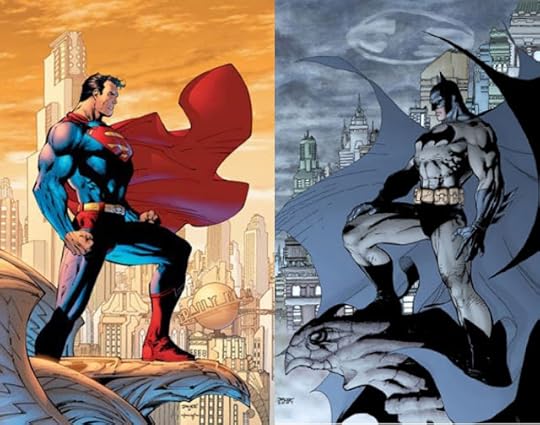



 In order to have a cinematic DC universe, the only option has always been to jumpstart it all at once. Man of Steel was nothing more than a toe test for the water. If they were to bring in the universe proper, it would have to be all at once or none at all.
In order to have a cinematic DC universe, the only option has always been to jumpstart it all at once. Man of Steel was nothing more than a toe test for the water. If they were to bring in the universe proper, it would have to be all at once or none at all.That's because that's how the DC universe is set up. An absurd amount of characters, both villains and heroes, with literally world-shaking events at a near constant rate. If you are going to open it up at all, nearly every story that spans more than a single geographic area is going to affect the entire world, if not the entire dimension, so if these other characters are already existing, but in the background, then they will show up in any consistent universe.

Any reasonable attempt so far to portray the DC universe on film has been so limiting as to be almost unrecognizable. As mentioned earlier, DC has world-shaking events at a near constant rate. I recently watched the first season of Young Justice and in one episode they were stopping an already erupting supervolcano (one of the regularly cited "end of humanity" events) and in another they prevented a black hole from forming (that had already started to suck in mass and rotate). This is a show about a team of superheroes that go in under the radar. In another episode, all major cities in the world were under attack by gas-spewing, regenerating supermassive plants.

I can see DC fans cheering for the terraforming mech in Man of Steel because that's the type of event that happens regularly in DC proper. I was left underwhelmed. It seemed like nothing but bloat, and an absurd escalation to an already world-changing event (alien super-powered army invasion wasn't enough). And that's ignoring the illogical choice to terraform Earth to be more like Krypton anyway (Kryptonians are super-powerful on Earth, why would they want to do anything to make things more like Krypton?).
The destruction of Metropolis in Man of Steel maybe isn't expected, but it's par for the course in a normal DC storyline.
The DC universe is so bloated, so incredible, that it lacks credibility on the screen. If it's represented in cinematic form the way it's presented in comics and many animation, then you're left watching an, "oh, that's cool looking" movie and that's it.
One of the reasons why Young Justice season 1 is involving and interesting is that the characters all go through some pretty interesting arcs, have emotional depth, have complex relationships, and feel like real people. It also helps that they aren't so absurdly overpowered as to require Darkseid or Doomsday to pose a challenge.
In general, you can boil down the characters in the DC universe to three-dimensional characters. There's so much backlog for them all that any halfway decent writer can do that. But they can't do that with the spectacle that is the DC universe proper.
How can you care about the struggle a character has to go through emotionally when literally in the next scene they are flying through the center of the planet or running faster than the speed of light?
I've always heard that DC has better stories and Marvel has better characters. I don't think that's true on either side. I think DC has more spectacle and Marvel has more character development.
They're both soap operas at the end of the day, but when translating those soaps to the big screen, character struggle with high stakes is 1000% more engrossing than big, bloated set pieces that aren't properly built up.
I get pretty tired hearing pundits implying that in order to do a DC cinematic universe it has to be done all at once. Their reasons are never stated as being in-universe reasons, but rather so WB can start to compete with Disney/Marvel on a financial stage. What? Are movies a zero-sum game? Can only one superhero movie studio do well per year? This is absurd, and it's the kind of thinking that sunk Spider-Man 3, Amazing Spider-Man 2, and Fantastic Four.
It's hard not to compare the different franchises, but let's discuss some things. First, when one of the main characters in the Marvel Studios Cinematic Universe (MCU) feels something or has a backstory or anything like that, guess what, we've all seen those things and can feel those things. They've been set-up. Arguably one of the best parts of the last trailer is Cap saying, "I could do this all day," because it's such a call-back to the first Cap film. This is 5 years of set-up for that one line. It was perfect.


In the newly rebooted X-Men franchise, the struggle between Magneto and Xavier and how Mystique is affected has never been clearer or better shown. In the first version of these movies, we relied on communal understanding of the characters and they still showed the struggle, but we didn't feel it as viscerally as we feel it now between these three. There's internal logic to the decisions the characters make.
For Deadpool, it's absurd and it's designed to be absurd, but we got an origin story anyway. It reset the origin from X-Men Origins for the character and now we all have a new understanding of the character. Deadpool is arguably one of the characters that could get away without explaining anything because more than an action superhero movie, it's a comedy. It has the other parts too, but the goal of the entire thing is sheer fun.
Maybe I take the storyline and characters too seriously for non-absurdist stories that are supposed to be good stories. I can't turn off my brain when I watch these characters because I care too much about them. I want the stories to be good. There's a reason I don't go watch Transformers anymore.
And then there's the current DCU.
It's hard not to feel like the entire motivation is out-of-universe. Let's rely entirely on the communal understanding of the characters and not have the motivation come from within. I can rationalize the end of the Man of Steel movie and much of Superman's actions throughout it, but I'm rationalizing it, and I'm more experienced than the average person going to a Superman movie. People don't know the stories from the comics as well as they do anything on TV or the big-screen. We have an idea of what Superman is already, and it's not what they gave us in Man of Steel. That's fine, but you can't set up the movie relying on the audience already knowing the characters if you're going to give us a different character without explanation.
The focus feels like it's on the spectacle and not the characters. And I think that's going to be the problem with any DC universe proper set-up that doesn't have a tight, controlled focus.

Published on March 24, 2016 15:49
March 22, 2016
Thoughts on Daredevil Season 2 (Spoiler Review)
This post will contain my thoughts on Daredevil Season 2 and will contain spoilers. If you found your way here before watching the show and care about spoilers, check out this no spoiler review and come back once you've watched the show. Basically, think of this as both of us have already seen the show and now we're talking about it at the water cooler. What did we think was cool, what didn't work, what was incredible. I'd love to hear your thoughts, so please comment below; spoilers welcome.
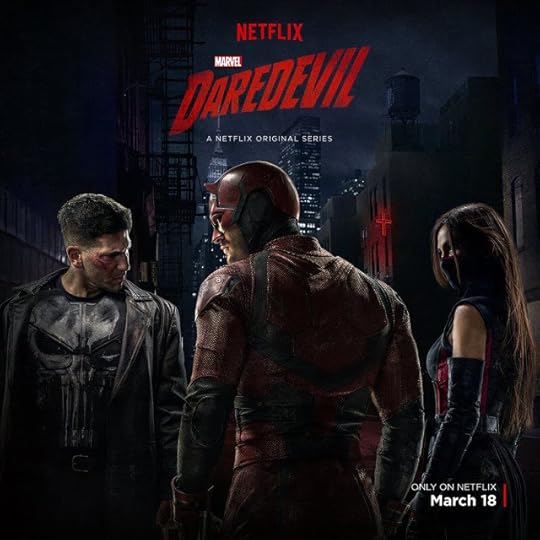
In Season 1, we had that incredible corridor fight scene, and whether it was intentional or just a result of how and who Daredevil fights, we had multiple great corridor fight scenes. Daredevil v. the Dogs of Hell and Punisher v. all the prisoners both stand out, but we also had Daredevil in sewers against ninja and Daredevil invading the Irish mob to rescue Punisher.
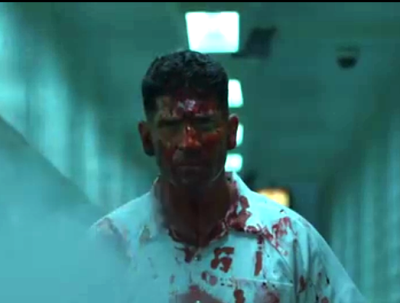
Every time one of these scenes is keying up, I just got giddy waiting for the sheer awesome that was about to follow.
I love how human Daredevil and the Punisher are. They are beat the crap up throughout the show. Daredevil has his helmet of awesomeness, but he gets shot, stabbed, etc. Punisher looks like HELL from Ep 4 on. The torture scenes were suitably visceral and cringe-worthy. Whether it's drill through the foot, or bamboo under the fingernails, that was not something I'd want to sit through.
Daredevil preventing Punisher from killing people on their way out was pretty cool. I thought of him acting like Spidey, pushing/pulling things just enough out of the way so that the Punisher wasn't able to finish any of the mobsters on the way out (although plenty were already killed before the Daredevil got there).
Both Jon Bernthal and Deborah Ann Woll had standout performances this season, and I'll be annoyed if both don't get Emmy nominations. From Bernthal, he was so keyed into the Punisher, that whether he was "punishing" or we were seeing a glimpse of his past through haunted eyes, it was something to watch. Woll was top-notch in every scene she was in. Everything was spot on and her character went through some great arcs: her romance with Murdock, her need to investigate Castle, her work on the Castle legal case with Foggy, her break-up with Murdock, her acceptance of the role at the Bulletin. Everything.
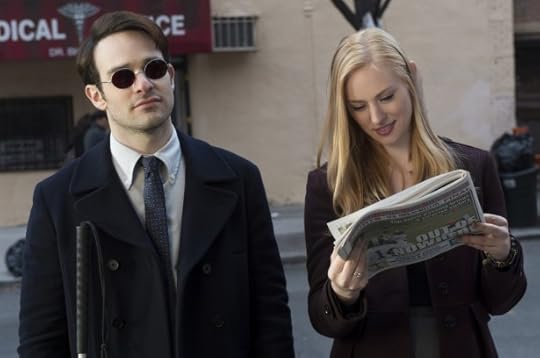
When I realized that Bernthal would be arrested early on, I totally got it. Here's another side of Murdock that we're going to see: the defense lawyer.
My introduction to Daredevil was his presence as a defense lawyer in the animated Spider-Man series of the 90s, and I've always thought of him as being the lawyer of the superheros, so it was incredibly disheartening to see him stumble his way through the trial. It didn't feel like how Murdock should be, even if he's dealing with the Hand alongside Elektra.
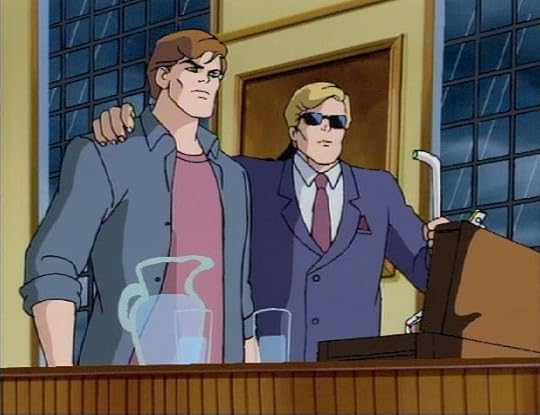
Then when you think he's going to come back in at the end and do some good, the Punisher screws the pooch. It would be nice to see Murdock v Foggy defending/suing a character like Luke Cage or Jessica Jones in a future series or season. I think they set that up well at the end for future seasons/series.
Elektra was a fantastic Elektra. To be perfectly honest, I've never been a big fan of the character, but I loved her role in the show. I thought her relationship with Matt was perfectly done and perfectly shown to us, and I found her personal arcs to be just as engaging as the other characters. My one issue was her threatening the medical examiner. That seemed a lot like plot convenience. She would know better than to do that and it's hard for me to look at how she's portrayed throughout the season and think she would think that would get her what she wants in ANY way. You can argue she was being vindictive, but that doesn't fit for me.
I can buy into the Punisher showing up at the end because he was listening to the police scanner and the police scanner was saying there's an army. But Foggy showing up? People had a tendency, especially near the end of the season, to just conveniently show up. The Punisher realizes his old lieutenant is the Blacksmith and crashes truck at exactly right time and place to effect his punishment? Plot convenience is convenient.
The final battle I had severe issues with. First, they show us a shot of dozens of ninja. Then, we see no more than 20 ninja in actual fight, and none breaking through from the building. I get that not every fight needs to be better than the one before it, but this was downright anticlimactic AND they have characters build it up even more like, "One thing is for sure, we will die" and "This could be the end of vigilantism". Seriously? Because Elektra (who no one knows anything about), Daredevil and a bunch of ninja are on top of a roof? Jessica Jones and Luke Cage are still out there. Hell, this is the Marvel universe now, Spider-Man is still out there. You're telling me vigilantism is over because a bunch of ninja no one can see is attacking Daredevil?
Also, why did they not get a helicopter with characters watching the fight and saying things like that? They had a helicopter earlier in the show unnecessarily. You're saying the budget was there for that but not for this? If either the detective or Karen had used her news resources to be in a news helicopter and they were watching Daredevil getting taken down by ninja and THEN they say those things that build up the fight and the struggle, then it's perfectly natural and understandable and adds to the drama. As it was, and especially with Foggy miraculously showing up, it felt forced.
Finally, the Punisher has a freaking arsenal now beyond anything he's had so far. That could have cut down on the ninja a bit more and would have shown us an unwinnable fight becoming plausibly winnable.
Lastly, we should have seen Daredevil come to some sort of acceptance about Nobu's immortality because otherwise his decision to throw him off the roof means he's committed murder now. And I get that we have Stick actually finish him off afterwards to "maintain the innocence of our hero," but that's a cop-out.
Away from the final fight, I loved that Daredevil had a hard time hearing ninja (they're freaking ninja after all), but I didn't get how he can't hear their heartbeats. The ninja are so ninja that their hearts are muffled? But he can hear their breathing no problem. Pretty silly. Maybe there was some explanation that I missed that would have explained it but it seemed implausible. I thought it would have made more sense that they were masking their breath for the most part and he had to rely on hearing their heartbeats. Also, in S1 they gave us this "world on fire" sonar vision but that doesn't apply to ninja? Okayyyy.
That's about all the nitpicky things I have to say. Overall, I was so impressed with the series. It feels like everything in Season 1 but better. Even though Matt hasn't changed much over the season, I would argue he's become more himself. And it was a satisfying arc to see. We saw Punisher and Elektra push and pull at his morality, and he came out stronger at the end (barring the Nobu murder).
I thought it was stupid they showed us that giant urn thing in the trailer if it ended up being more of a tease for next season, but it was fine in-show. Can't complain too much about advertising interfering with the show itself.
If I think of any other thoughts, I'll add them in the comments. What did you think? Are you looking forward to Luke Cage? There's a no spoiler teaser floating around for it somewhere (that I found underwhelming—but I'm still looking forward to seeing the series).
So far, Netflix Marvel is 3 for 3 in my opinion. I can't compare Jessica Jones to Daredevil because they're apples and oranges (fruit, comparison made), but both Jessica Jones S1 and Daredevil S2 were the best of what they are and I can't wait for more from them.
I do wonder how it will feel for Spider-Man to be a part of the cinematic universe and not interacting with the street level characters. Don't get me wrong, Spider-Man is an avenger, but what he does on a daily basis is fight street crime. He flips around the city and stops muggings, etc. It just so happens that he gets in over his head with supervillains every so often and makes a name for himself on the global/intergalactic/interdimensional scale as well. It also helps that he goes all over the city of New York due to his mobility and isn't restrained to just one tiny neighborhood (coff, Hell's Kitchen, coff).
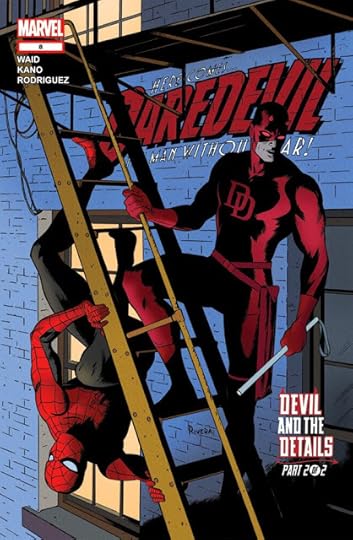

In Season 1, we had that incredible corridor fight scene, and whether it was intentional or just a result of how and who Daredevil fights, we had multiple great corridor fight scenes. Daredevil v. the Dogs of Hell and Punisher v. all the prisoners both stand out, but we also had Daredevil in sewers against ninja and Daredevil invading the Irish mob to rescue Punisher.

Every time one of these scenes is keying up, I just got giddy waiting for the sheer awesome that was about to follow.
I love how human Daredevil and the Punisher are. They are beat the crap up throughout the show. Daredevil has his helmet of awesomeness, but he gets shot, stabbed, etc. Punisher looks like HELL from Ep 4 on. The torture scenes were suitably visceral and cringe-worthy. Whether it's drill through the foot, or bamboo under the fingernails, that was not something I'd want to sit through.
Daredevil preventing Punisher from killing people on their way out was pretty cool. I thought of him acting like Spidey, pushing/pulling things just enough out of the way so that the Punisher wasn't able to finish any of the mobsters on the way out (although plenty were already killed before the Daredevil got there).
Both Jon Bernthal and Deborah Ann Woll had standout performances this season, and I'll be annoyed if both don't get Emmy nominations. From Bernthal, he was so keyed into the Punisher, that whether he was "punishing" or we were seeing a glimpse of his past through haunted eyes, it was something to watch. Woll was top-notch in every scene she was in. Everything was spot on and her character went through some great arcs: her romance with Murdock, her need to investigate Castle, her work on the Castle legal case with Foggy, her break-up with Murdock, her acceptance of the role at the Bulletin. Everything.

When I realized that Bernthal would be arrested early on, I totally got it. Here's another side of Murdock that we're going to see: the defense lawyer.
My introduction to Daredevil was his presence as a defense lawyer in the animated Spider-Man series of the 90s, and I've always thought of him as being the lawyer of the superheros, so it was incredibly disheartening to see him stumble his way through the trial. It didn't feel like how Murdock should be, even if he's dealing with the Hand alongside Elektra.

Then when you think he's going to come back in at the end and do some good, the Punisher screws the pooch. It would be nice to see Murdock v Foggy defending/suing a character like Luke Cage or Jessica Jones in a future series or season. I think they set that up well at the end for future seasons/series.
Elektra was a fantastic Elektra. To be perfectly honest, I've never been a big fan of the character, but I loved her role in the show. I thought her relationship with Matt was perfectly done and perfectly shown to us, and I found her personal arcs to be just as engaging as the other characters. My one issue was her threatening the medical examiner. That seemed a lot like plot convenience. She would know better than to do that and it's hard for me to look at how she's portrayed throughout the season and think she would think that would get her what she wants in ANY way. You can argue she was being vindictive, but that doesn't fit for me.
I can buy into the Punisher showing up at the end because he was listening to the police scanner and the police scanner was saying there's an army. But Foggy showing up? People had a tendency, especially near the end of the season, to just conveniently show up. The Punisher realizes his old lieutenant is the Blacksmith and crashes truck at exactly right time and place to effect his punishment? Plot convenience is convenient.
The final battle I had severe issues with. First, they show us a shot of dozens of ninja. Then, we see no more than 20 ninja in actual fight, and none breaking through from the building. I get that not every fight needs to be better than the one before it, but this was downright anticlimactic AND they have characters build it up even more like, "One thing is for sure, we will die" and "This could be the end of vigilantism". Seriously? Because Elektra (who no one knows anything about), Daredevil and a bunch of ninja are on top of a roof? Jessica Jones and Luke Cage are still out there. Hell, this is the Marvel universe now, Spider-Man is still out there. You're telling me vigilantism is over because a bunch of ninja no one can see is attacking Daredevil?
Also, why did they not get a helicopter with characters watching the fight and saying things like that? They had a helicopter earlier in the show unnecessarily. You're saying the budget was there for that but not for this? If either the detective or Karen had used her news resources to be in a news helicopter and they were watching Daredevil getting taken down by ninja and THEN they say those things that build up the fight and the struggle, then it's perfectly natural and understandable and adds to the drama. As it was, and especially with Foggy miraculously showing up, it felt forced.
Finally, the Punisher has a freaking arsenal now beyond anything he's had so far. That could have cut down on the ninja a bit more and would have shown us an unwinnable fight becoming plausibly winnable.
Lastly, we should have seen Daredevil come to some sort of acceptance about Nobu's immortality because otherwise his decision to throw him off the roof means he's committed murder now. And I get that we have Stick actually finish him off afterwards to "maintain the innocence of our hero," but that's a cop-out.
Away from the final fight, I loved that Daredevil had a hard time hearing ninja (they're freaking ninja after all), but I didn't get how he can't hear their heartbeats. The ninja are so ninja that their hearts are muffled? But he can hear their breathing no problem. Pretty silly. Maybe there was some explanation that I missed that would have explained it but it seemed implausible. I thought it would have made more sense that they were masking their breath for the most part and he had to rely on hearing their heartbeats. Also, in S1 they gave us this "world on fire" sonar vision but that doesn't apply to ninja? Okayyyy.
That's about all the nitpicky things I have to say. Overall, I was so impressed with the series. It feels like everything in Season 1 but better. Even though Matt hasn't changed much over the season, I would argue he's become more himself. And it was a satisfying arc to see. We saw Punisher and Elektra push and pull at his morality, and he came out stronger at the end (barring the Nobu murder).
I thought it was stupid they showed us that giant urn thing in the trailer if it ended up being more of a tease for next season, but it was fine in-show. Can't complain too much about advertising interfering with the show itself.
If I think of any other thoughts, I'll add them in the comments. What did you think? Are you looking forward to Luke Cage? There's a no spoiler teaser floating around for it somewhere (that I found underwhelming—but I'm still looking forward to seeing the series).
So far, Netflix Marvel is 3 for 3 in my opinion. I can't compare Jessica Jones to Daredevil because they're apples and oranges (fruit, comparison made), but both Jessica Jones S1 and Daredevil S2 were the best of what they are and I can't wait for more from them.
I do wonder how it will feel for Spider-Man to be a part of the cinematic universe and not interacting with the street level characters. Don't get me wrong, Spider-Man is an avenger, but what he does on a daily basis is fight street crime. He flips around the city and stops muggings, etc. It just so happens that he gets in over his head with supervillains every so often and makes a name for himself on the global/intergalactic/interdimensional scale as well. It also helps that he goes all over the city of New York due to his mobility and isn't restrained to just one tiny neighborhood (coff, Hell's Kitchen, coff).

Published on March 22, 2016 13:28
March 21, 2016
Daredevil Season 2 Review (No spoilers)
What a weekend!
The 13 episode Daredevil Season 2 released Friday and if you've been on the fence about watching S2 (or even S1), then this review is for you. If you've already seen it, then skip on over to the spoiler discussion (link here).
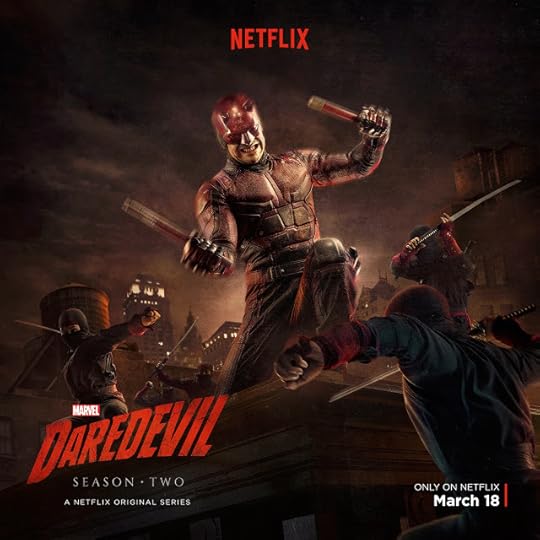 I'll do my best to speak in the vaguest terms about the events of the season and won't reveal any major plot points.
I'll do my best to speak in the vaguest terms about the events of the season and won't reveal any major plot points.
First, this season did a great job showcasing the two supporting "heroes" of Punisher and Electra. I can say without reservation that these iterations of Punisher and Elektra are the best film versions of the characters ever (not that Elektra really had much competition).
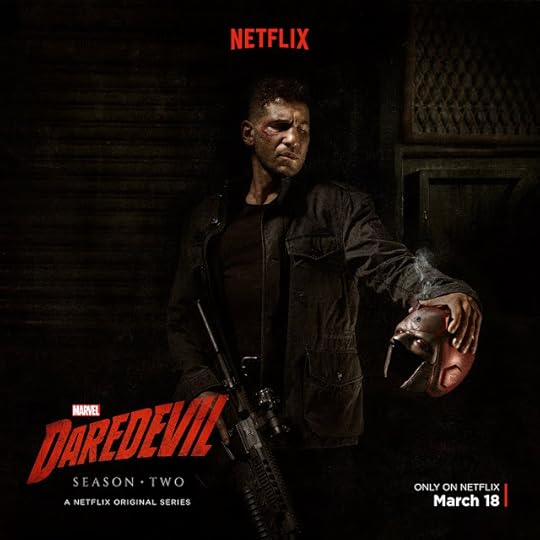
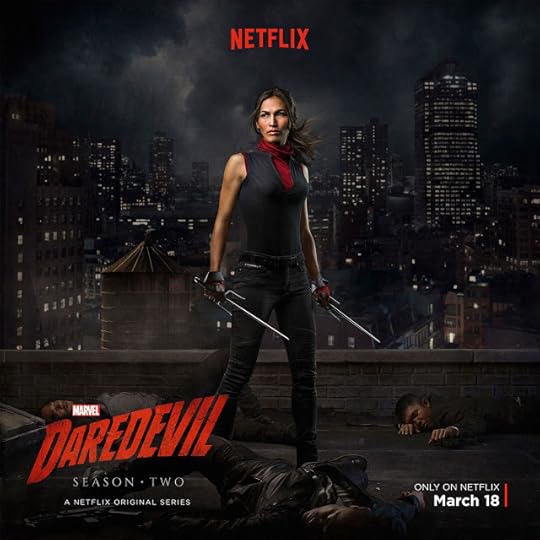
If you're a fan of these characters, you will not be disappointed and if you weren't already a fan, you will be by the end of the season. Both get plenty of screentime and have full arcs with character development/reveals.
You can argue that Daredevil may take a backseat to these characters at times, but the show is so densely packed with material (~53 minute episodes with no commercials and never afraid to get to the next plot) that I think you're probably a whiner if you do argue that. I'd argue that Daredevil developed even more than he did in the first season when he didn't have to share screentime.
The action has been ratcheted up from Season 1 with not one, but TWO great corridor fight scenes along with higher level, more visceral fights throughout.
The acting from nearly all characters returning has improved, with some standouts (Deborah Ann Woll as Karen Page most notably). Foggy might still be the weakest when the story turns onto him, but he's more than serviceable and if you think of it in-universe, then his actions, reactions and general personality seems genuine.
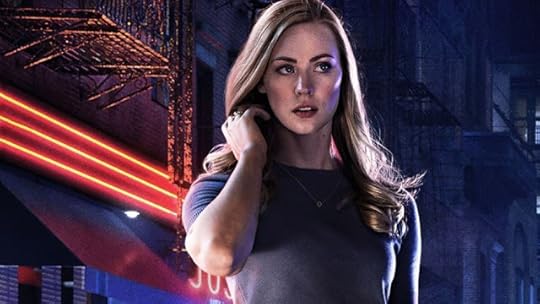
Storylines from Season 1 continue or are brought back up in Season 2, some things are resolved, some things are not. The show was borderline R rating in Season 1, but definitely earns the rating in Season 2 from violence alone.
I could not be more pleased with Daredevil Season 2. It's a different beast than Jessica Jones, but if you look at Daredevil as a separate type of show, and enjoyed the first season, you should not be disappointed with the second. In my opinion, it was better in every way.
Pros:
Cons:
The 13 episode Daredevil Season 2 released Friday and if you've been on the fence about watching S2 (or even S1), then this review is for you. If you've already seen it, then skip on over to the spoiler discussion (link here).
 I'll do my best to speak in the vaguest terms about the events of the season and won't reveal any major plot points.
I'll do my best to speak in the vaguest terms about the events of the season and won't reveal any major plot points.First, this season did a great job showcasing the two supporting "heroes" of Punisher and Electra. I can say without reservation that these iterations of Punisher and Elektra are the best film versions of the characters ever (not that Elektra really had much competition).


If you're a fan of these characters, you will not be disappointed and if you weren't already a fan, you will be by the end of the season. Both get plenty of screentime and have full arcs with character development/reveals.
You can argue that Daredevil may take a backseat to these characters at times, but the show is so densely packed with material (~53 minute episodes with no commercials and never afraid to get to the next plot) that I think you're probably a whiner if you do argue that. I'd argue that Daredevil developed even more than he did in the first season when he didn't have to share screentime.
The action has been ratcheted up from Season 1 with not one, but TWO great corridor fight scenes along with higher level, more visceral fights throughout.
The acting from nearly all characters returning has improved, with some standouts (Deborah Ann Woll as Karen Page most notably). Foggy might still be the weakest when the story turns onto him, but he's more than serviceable and if you think of it in-universe, then his actions, reactions and general personality seems genuine.

Storylines from Season 1 continue or are brought back up in Season 2, some things are resolved, some things are not. The show was borderline R rating in Season 1, but definitely earns the rating in Season 2 from violence alone.
I could not be more pleased with Daredevil Season 2. It's a different beast than Jessica Jones, but if you look at Daredevil as a separate type of show, and enjoyed the first season, you should not be disappointed with the second. In my opinion, it was better in every way.
Pros:
Action improved and more of it
Acting improved
No hesitation in the plot, but never felt rushed
Perfect casting with Jon Bernthal as the Punisher and Elodie Yung as Elektra
Callbacks to Season 1 felt natural and leave the door open for more
Complete character arcs
Cons:
No cameos from Marvel Cinematic Universe proper and only one mention.So that's what I thought. What do you think? Have you checked out Daredevil Seasons 1 and 2? I was impressed by the first season and everything was better in the second season so I have no real complaints. I saw some articles suggesting Season 2 is worse than Season 1, but I honestly am not sure what show those people were watching (my only thought is that they went in after binging Jessica Jones and expected another show of that variety instead of a follow-up to Daredevil S1—the two are almost different genres. Daredevil is more of a gritty morality action drama while Jessica Jones is a psychological noir).
Limited cameos from Marvel Netflix Universe (Defenders)
Some fights are not as cool as other fights, but are built up to be cool by the characters (so you're let down)
Some convenience in characters showing up at the right time and place
Published on March 21, 2016 14:11
March 18, 2016
Captain America Civil War with Spider-Man Fan Theory and Its Ramifications
Hey guys!
I recently posted my hopes for the new Captain America Civil War movie based on a single image from the trailer:
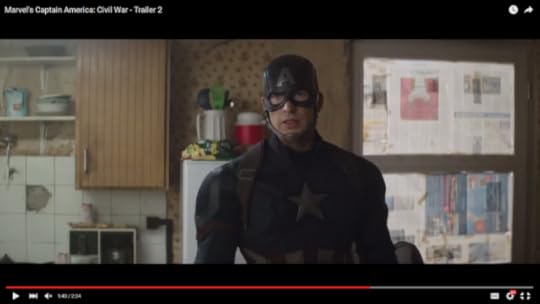
It was so rundown that it cast some doubt on my theory that this kitchen Cap is standing in is Peter Parker's, but wait, there's ANOTHER PHOTO:
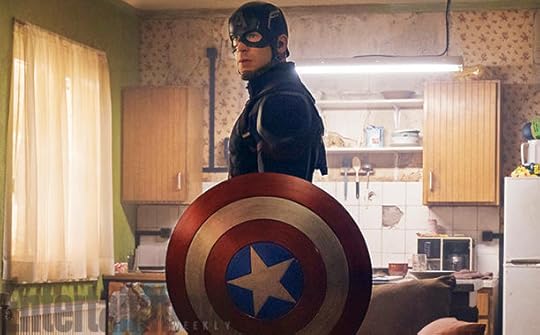 This photo is from Entertainment Weekly from a while ago and went under my radar, but it's so brightly lit that I think it is more confirmation that this apartment is in fact Peter and his aunt's. In the days immediately following my last post, I found several sites outright saying that this image from Entertainment Weekly was confirmed to be Peter Parker's kitchen, but I haven't been able to find those again since then, so I'm not sure if those things were reined back or if they were more things like this, random musings of fans that won't make the top page of Google unless they're in the middle of going viral.
This photo is from Entertainment Weekly from a while ago and went under my radar, but it's so brightly lit that I think it is more confirmation that this apartment is in fact Peter and his aunt's. In the days immediately following my last post, I found several sites outright saying that this image from Entertainment Weekly was confirmed to be Peter Parker's kitchen, but I haven't been able to find those again since then, so I'm not sure if those things were reined back or if they were more things like this, random musings of fans that won't make the top page of Google unless they're in the middle of going viral.
Anyway, so if this is Peter's kitchen, then that means Cap is saying, "There's no need for this to end in a fight, Spider-Man"! not, "There's no need for this to end in a fight, Tony."
In reality, he probably doesn't end the sentence with Spidey's name, because it's a bit clunky writing-wise. But still, the fact of the matter is that Captain America is standing in Peter Parker's kitchen.
So what does this mean for the web-head?
I think it means he's poor. Like really poor, not just movie poor like he has been in the last two iterations of the character on the big screen.
2002's Aunt May (played by Rosemary Harris) was clearly retired and living on a fixed income. It was played to comedic effect in the bank scene in Spider-Man 2, and Peter may have never been well off living with a retired individual, but they really didn't seem to struggle like we see Peter do in the comics.
2012's Aunt May (played by the wonderful Sally Field) may have been working class, but have you seen their house? That's a nice bloody house. Uncle Ben probably had a union job of some sort. They were doing OK. And they managed to continue doing OK afterwards. Sally Field started taking classes to become a nurse, but these things always seemed secondary to the setting and never that pressing in the way money is a pressing concern.
Hell, in both Spider-Man movies, Peter Parker is able to rapidly develop cosplay that would cost quite a lot to make/buy yourself. It's not cheap to look that good.
I think more than ever before, we're going to see a Peter Parker that is struggling to stay afloat economically. A kid that has serious concerns about money and the cost that he imposes on his aunt.
I'd go on to say that the reason why Tony Stark refers to Spider-Man as "underoos" is because he's probably been trying to fight crime in something resembling pajamas and not an actual suit. The first time they meet, Tony Stark is probably going to comment on that because Tony is a jackass.
And how long would it take Tony to work something up in his laboratories to fit Spidey? That's the suit we see in the trailer (and even more reason why revealing it in the trailer was the perfect way to do it). That is Spidey standing undeniably alongside Marvel with the current symbol of Marvel in Cap's shield and not some poor kid that can't make a halfway decent Spider-Man suit that we will inevitably encounter first.
So yeah, I am so looking forward to seeing Spidey on the big screen, but even more I am looking forward to Cap talking with Spidey. Being a role-model for Spidey. Cap understands economic hardships. No matter which universe you go off, he was born in the 20s and lived through the Great Depression. He's been to war. He's dealt with hunger. Cap grew up in Brooklyn and Spidey grew up in Queens. They can relate.
When Captain America needs your help, there's no better reason. Cap's influence on Spidey cannot be understated. And Cap showing up in his kitchen, presumably after his reveal and shield stealing, means so much for the future of this character.
What do you guys think? Does the second picture make it more likely Cap is in Spidey's kitchen? Less? What does it mean to have a poor Spider-Man for the purposes of his character and storyline moving forward? Will Spider-Man receive a stipend from the Avengers? Will Spidey be the linchpin of this movie or merely window dressing? Have I gone on entirely too long about two pictures from slightly different angles in a run-down kitchen? Comment, share, and subscribe!
I recently posted my hopes for the new Captain America Civil War movie based on a single image from the trailer:

It was so rundown that it cast some doubt on my theory that this kitchen Cap is standing in is Peter Parker's, but wait, there's ANOTHER PHOTO:
 This photo is from Entertainment Weekly from a while ago and went under my radar, but it's so brightly lit that I think it is more confirmation that this apartment is in fact Peter and his aunt's. In the days immediately following my last post, I found several sites outright saying that this image from Entertainment Weekly was confirmed to be Peter Parker's kitchen, but I haven't been able to find those again since then, so I'm not sure if those things were reined back or if they were more things like this, random musings of fans that won't make the top page of Google unless they're in the middle of going viral.
This photo is from Entertainment Weekly from a while ago and went under my radar, but it's so brightly lit that I think it is more confirmation that this apartment is in fact Peter and his aunt's. In the days immediately following my last post, I found several sites outright saying that this image from Entertainment Weekly was confirmed to be Peter Parker's kitchen, but I haven't been able to find those again since then, so I'm not sure if those things were reined back or if they were more things like this, random musings of fans that won't make the top page of Google unless they're in the middle of going viral. Anyway, so if this is Peter's kitchen, then that means Cap is saying, "There's no need for this to end in a fight, Spider-Man"! not, "There's no need for this to end in a fight, Tony."
In reality, he probably doesn't end the sentence with Spidey's name, because it's a bit clunky writing-wise. But still, the fact of the matter is that Captain America is standing in Peter Parker's kitchen.
So what does this mean for the web-head?
I think it means he's poor. Like really poor, not just movie poor like he has been in the last two iterations of the character on the big screen.
2002's Aunt May (played by Rosemary Harris) was clearly retired and living on a fixed income. It was played to comedic effect in the bank scene in Spider-Man 2, and Peter may have never been well off living with a retired individual, but they really didn't seem to struggle like we see Peter do in the comics.
2012's Aunt May (played by the wonderful Sally Field) may have been working class, but have you seen their house? That's a nice bloody house. Uncle Ben probably had a union job of some sort. They were doing OK. And they managed to continue doing OK afterwards. Sally Field started taking classes to become a nurse, but these things always seemed secondary to the setting and never that pressing in the way money is a pressing concern.
Hell, in both Spider-Man movies, Peter Parker is able to rapidly develop cosplay that would cost quite a lot to make/buy yourself. It's not cheap to look that good.
I think more than ever before, we're going to see a Peter Parker that is struggling to stay afloat economically. A kid that has serious concerns about money and the cost that he imposes on his aunt.
I'd go on to say that the reason why Tony Stark refers to Spider-Man as "underoos" is because he's probably been trying to fight crime in something resembling pajamas and not an actual suit. The first time they meet, Tony Stark is probably going to comment on that because Tony is a jackass.
And how long would it take Tony to work something up in his laboratories to fit Spidey? That's the suit we see in the trailer (and even more reason why revealing it in the trailer was the perfect way to do it). That is Spidey standing undeniably alongside Marvel with the current symbol of Marvel in Cap's shield and not some poor kid that can't make a halfway decent Spider-Man suit that we will inevitably encounter first.
So yeah, I am so looking forward to seeing Spidey on the big screen, but even more I am looking forward to Cap talking with Spidey. Being a role-model for Spidey. Cap understands economic hardships. No matter which universe you go off, he was born in the 20s and lived through the Great Depression. He's been to war. He's dealt with hunger. Cap grew up in Brooklyn and Spidey grew up in Queens. They can relate.
When Captain America needs your help, there's no better reason. Cap's influence on Spidey cannot be understated. And Cap showing up in his kitchen, presumably after his reveal and shield stealing, means so much for the future of this character.
What do you guys think? Does the second picture make it more likely Cap is in Spidey's kitchen? Less? What does it mean to have a poor Spider-Man for the purposes of his character and storyline moving forward? Will Spider-Man receive a stipend from the Avengers? Will Spidey be the linchpin of this movie or merely window dressing? Have I gone on entirely too long about two pictures from slightly different angles in a run-down kitchen? Comment, share, and subscribe!
Published on March 18, 2016 13:40
Daredevil Season 2 First Impressions
Daredevil is back!
One of the best surprises of last year from Marvel after the disappointing Agents of Shield, Daredevil (along with the rest of the Defenders) have been absolute home runs. Season 2 dropped today and I just finished watching the premiere episode moments ago.

It's so good guys.
The opening was cool, and the first scene featuring Murdock and Foggy really shows where the minds of these characters are after the events of the first season: Murdock is in full service mode—"If I take a night off, people get hurt," and Foggy has really turned the corner on his relationship with Murdock.
There was a portion of last season where Foggy was a drag on the events of the show, not unrealistic, but there were many times where I would tense up when Foggy came on. I'm glad to see him over the hump so to speak; still dealing with the fact that his friend is a masked vigilante and what that entails, but accepting and understanding. It's great.
Daredevil's interaction with the arms dealer, Turk Barrett, was an interesting way to showcase what we assume will be part of the major drama of the season. Begging for a break from Daredevil, he gives up on being let off and says, "You know I'll be out in a month anyway."
This is great. I don't know if it's almost too in your face, but knowing that a large part of the action will be the psychological action of "is Daredevil's way effective, worthwhile, etc, or is Punisher's way, although unsavory, actually doing more good?" means that any chance we can get to cast doubt Daredevil's way early on is worth doing for his arc this season.
The first moment we get an idea of the Punisher is really well done and the directors/writers made a great decision to not blow their wad early with the reveal. We see the effects of his actions, and anyone who had watched the trailer knows what is causing it. Waiting for the Punisher to be revealed was the absolute right decision there. Daredevil exploring the Punisher's lair was sufficiently creepy and deranged to the point that we really see the type of Punisher we're going to be dealing with in this show. The exploration of his lair could have been in a horror movie. A good horror movie, and it was just a single scene from this break-out first episode. This is not the stick-a-popsicle-in-your-back Punisher.
Kudos to Deborah Ann Wall for her portrayal of Karen Page already. She was surprisingly great, and I don't know why I keep being surprised by this cast and crew. I was really pleased with her actions in the episode though.
Everything felt like it was a steady progression from Season 1 and where there may have been some fumbling here and there in that Season, the Daredevil machine is a finely tuned machine by now (at least for this first episode!). It was one of the best first episodes of a new season I can recall.
It was reallllly good.
I won't ruin the finale of the first episode for you, but it was great as well and I cannot wait to watch the second episode.
So have you seen this yet? What did you think? What are you hoping happens to the man without fear this season? If the show is going to be as strong and compelling as it was this first episode, it may supplant Season 1 of Jessica Jones as my favorite Marvel show. Here's hoping!
(No more individual episode reviews for Daredevil this season—unless something truly epic happens that I can't help but blog about—but keep an eye out for the Season 2 review sometime next week).
One of the best surprises of last year from Marvel after the disappointing Agents of Shield, Daredevil (along with the rest of the Defenders) have been absolute home runs. Season 2 dropped today and I just finished watching the premiere episode moments ago.

It's so good guys.
The opening was cool, and the first scene featuring Murdock and Foggy really shows where the minds of these characters are after the events of the first season: Murdock is in full service mode—"If I take a night off, people get hurt," and Foggy has really turned the corner on his relationship with Murdock.
There was a portion of last season where Foggy was a drag on the events of the show, not unrealistic, but there were many times where I would tense up when Foggy came on. I'm glad to see him over the hump so to speak; still dealing with the fact that his friend is a masked vigilante and what that entails, but accepting and understanding. It's great.
Daredevil's interaction with the arms dealer, Turk Barrett, was an interesting way to showcase what we assume will be part of the major drama of the season. Begging for a break from Daredevil, he gives up on being let off and says, "You know I'll be out in a month anyway."
This is great. I don't know if it's almost too in your face, but knowing that a large part of the action will be the psychological action of "is Daredevil's way effective, worthwhile, etc, or is Punisher's way, although unsavory, actually doing more good?" means that any chance we can get to cast doubt Daredevil's way early on is worth doing for his arc this season.
The first moment we get an idea of the Punisher is really well done and the directors/writers made a great decision to not blow their wad early with the reveal. We see the effects of his actions, and anyone who had watched the trailer knows what is causing it. Waiting for the Punisher to be revealed was the absolute right decision there. Daredevil exploring the Punisher's lair was sufficiently creepy and deranged to the point that we really see the type of Punisher we're going to be dealing with in this show. The exploration of his lair could have been in a horror movie. A good horror movie, and it was just a single scene from this break-out first episode. This is not the stick-a-popsicle-in-your-back Punisher.
Kudos to Deborah Ann Wall for her portrayal of Karen Page already. She was surprisingly great, and I don't know why I keep being surprised by this cast and crew. I was really pleased with her actions in the episode though.
Everything felt like it was a steady progression from Season 1 and where there may have been some fumbling here and there in that Season, the Daredevil machine is a finely tuned machine by now (at least for this first episode!). It was one of the best first episodes of a new season I can recall.
It was reallllly good.
I won't ruin the finale of the first episode for you, but it was great as well and I cannot wait to watch the second episode.
So have you seen this yet? What did you think? What are you hoping happens to the man without fear this season? If the show is going to be as strong and compelling as it was this first episode, it may supplant Season 1 of Jessica Jones as my favorite Marvel show. Here's hoping!
(No more individual episode reviews for Daredevil this season—unless something truly epic happens that I can't help but blog about—but keep an eye out for the Season 2 review sometime next week).
Published on March 18, 2016 13:00
March 11, 2016
Cap's Plea to Spidey — Civil War Fan Theory Based on Trailer 2
Warning: This contains my personal hope/theory for the new Civil War movie, specifically involving Spider-Man's involvement/interaction with Captain America. The more I look at the image that inspired this hope, the less I believe it will be true, but you know, who knows. So spoiler warning if you think I'm prescient.
Here's the image in question:
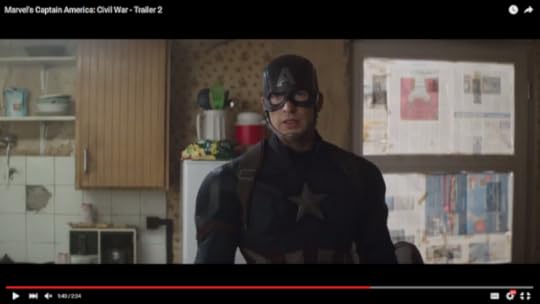
When I heard this, I went, "That Tony kinda' seemed tacked on there," and if you watch, the scene changes entirely when the "Tony" is heard to an entirely different setting. So no matter what, this image is from a different scene than the image we see next. I'm fairly confident that the "Tony" is from a different line stitched together through the magics of editing.
So I doubt he's talking to Iron Man when he's standing in that kitchen. So who could he be talking to?
Looking at the kitchen, it's worn down. Hard core worn down. And the newspapers on the wall . . . are they blocking windows or just stories that want to be emphasized? It looks like it hasn't been inhabited since the 70s, but there's a refrigerator, some sort of food, clean utensils, a thermos, etc, so it is inhabited. Maybe Aunt May doesn't know how to fix things around the house and can't afford to pay people to fix things so now that Uncle Ben is dead, they've gotten pretty dilapidated?
That's what I'd like to believe. Now, after looking closer at the image than I did while watching the trailer, I kinda' think it's more plausible (given how run down it is) that this is an abandoned apartment that the Winter Soldier is shacking up in, but let's run with the idea that it's Spider-Man's kitchen and standing across from Cap during this very image when he says, "This doesn't have to end in a fight . . . " is Peter Parker and Aunt May (played by Marisa Tomei who has been cast as Aunt May for seemingly longer than Tom Holland as Spidey so isn't it at least somewhat likely she'll show up in this movie?).
If so, then I think that this is definitely taking place after Spidey shows up in his slick outfit with mechanical eyes made by Stark. Here's Cap's chance to speak with a new hero that, although is pretty worshipful of Tony Stark, has a good head on his shoulders and wants to do the right thing as much as any hero. Here's Cap's chance to win over the new guy that could lead Earth's mightiest heroes someday.
Why would Cap care? Because Cap cares. Why is this pivotal? Because Spider-Man is an unknown, that although is won over initially by Stark's general shininess (as well as his brilliance/genius which Peter Parker the genius kid scientist would definitely admire), probably doesn't have an idea of the scope of the conflict between the two titans. I wouldn't be surprised if Cap has a crisis of confidence sometime after the conflict ending with Stark's black eye, broken arm, and Rhodey's blast from the sky (death?!), and speaking with Spidey is the way he comes back to himself and also inspires Spidey to become the hero we all want him to be.
Don't ruin this Marvel/Sony. I can't go through another Amazing Spider-Man 2 / Spider-Man 3. Just don't.
Give us Peter Parker at his best, looking up to the best hero in the Marvel pantheon: Cap.
Here's an excerpt from a book I have called "Revenge of the Sinister Six" by Adam-Troy Castro. I think it illustrates rather well Spidey's thoughts on Cap and Cap's general awesomeness; it's a little long, but if you love these two characters, I think it's worth the read (also, worth mentioning, the main bad guy in both this book and "Secret of the Sinister Six" is Gustav Fiers, the shadowy gentleman at the end of Amazing Spider-Man 1 and 2 who they demoted to just a henchman of Osborn in the movies:
So what do you think? Total hogwash? Possible a kernel of truth? We'll find out May 6th! I can't wait.
Also, second trailer's out if you haven't seen it:
Here's the image in question:

When I heard this, I went, "That Tony kinda' seemed tacked on there," and if you watch, the scene changes entirely when the "Tony" is heard to an entirely different setting. So no matter what, this image is from a different scene than the image we see next. I'm fairly confident that the "Tony" is from a different line stitched together through the magics of editing.
So I doubt he's talking to Iron Man when he's standing in that kitchen. So who could he be talking to?
Looking at the kitchen, it's worn down. Hard core worn down. And the newspapers on the wall . . . are they blocking windows or just stories that want to be emphasized? It looks like it hasn't been inhabited since the 70s, but there's a refrigerator, some sort of food, clean utensils, a thermos, etc, so it is inhabited. Maybe Aunt May doesn't know how to fix things around the house and can't afford to pay people to fix things so now that Uncle Ben is dead, they've gotten pretty dilapidated?
That's what I'd like to believe. Now, after looking closer at the image than I did while watching the trailer, I kinda' think it's more plausible (given how run down it is) that this is an abandoned apartment that the Winter Soldier is shacking up in, but let's run with the idea that it's Spider-Man's kitchen and standing across from Cap during this very image when he says, "This doesn't have to end in a fight . . . " is Peter Parker and Aunt May (played by Marisa Tomei who has been cast as Aunt May for seemingly longer than Tom Holland as Spidey so isn't it at least somewhat likely she'll show up in this movie?).
If so, then I think that this is definitely taking place after Spidey shows up in his slick outfit with mechanical eyes made by Stark. Here's Cap's chance to speak with a new hero that, although is pretty worshipful of Tony Stark, has a good head on his shoulders and wants to do the right thing as much as any hero. Here's Cap's chance to win over the new guy that could lead Earth's mightiest heroes someday.
Why would Cap care? Because Cap cares. Why is this pivotal? Because Spider-Man is an unknown, that although is won over initially by Stark's general shininess (as well as his brilliance/genius which Peter Parker the genius kid scientist would definitely admire), probably doesn't have an idea of the scope of the conflict between the two titans. I wouldn't be surprised if Cap has a crisis of confidence sometime after the conflict ending with Stark's black eye, broken arm, and Rhodey's blast from the sky (death?!), and speaking with Spidey is the way he comes back to himself and also inspires Spidey to become the hero we all want him to be.
Don't ruin this Marvel/Sony. I can't go through another Amazing Spider-Man 2 / Spider-Man 3. Just don't.
Give us Peter Parker at his best, looking up to the best hero in the Marvel pantheon: Cap.
Here's an excerpt from a book I have called "Revenge of the Sinister Six" by Adam-Troy Castro. I think it illustrates rather well Spidey's thoughts on Cap and Cap's general awesomeness; it's a little long, but if you love these two characters, I think it's worth the read (also, worth mentioning, the main bad guy in both this book and "Secret of the Sinister Six" is Gustav Fiers, the shadowy gentleman at the end of Amazing Spider-Man 1 and 2 who they demoted to just a henchman of Osborn in the movies:
Jarvis and Spider-Man found Captain America training in his familiar red-white-and-blue costume, half leotard, half chain-mail, with the star on his chest and vertical red and white stripes girding his waist. His exercise equipment consisted of two dozen floating platforms, all of which remained in constant motion, bobbing up and down, sliding in random directions, or even upending; Captain America was in constant motion as well, leaping and somersaulting from one to another as cannons in all four walls targeted him in a crossfire of razor-sharp flechettes. The regimen would have been suicidal for a normal man and insanely dangerous for most experienced combat soldiers. For Spider-Man, who'd left normality behind many years ago, the routine would have been survivable but it not exactly his idea of a fun way to spend his afternoon. But Captain America was clearly in his element; as he dodged one deadly volley by leaping straight up, performing dizzying pirouettes in mid-air, and batting aside a multidirectional blizzard of gleaming knives with swats from his famously indestructible star-spangled shield, he was even—frighteningly enough—smiling.So that's part of what I'm hoping to see. I want to see SPIDEY as he should be, interacting with the other characters as he should be. And I mean, change what you need to in order to make a good movie/story of course. But give us Spidey!
As Spider-Man watched, the flechettes scattered over the gymnasium floor were being gathered up by a fleet of servitor robots that then carried them through sliding panels at ground level. To be fired again, he supposed. Captain America would naturally be a heavy supporter of recycling.
"Wow," said Spider-Man. "Jarvis, how long has he been at this?"
"A couple of hours at this setting. Give or take fifty years, of course."
Another good reason for the recycling; at the rate the flechettes were being fired, it wouldn't have taken very long to fill this entire gymnasium to waist-level. Spider-Man shook his head. Strictly speaking, he was many times stronger, faster, more agile, and more tireless than the living legend before him; he was, after all, superhuman, and Captain America was merely (merely!) the pinnacle of human potential, polished by decades of experience.Strictly speaking, Spider-Man could handle everything Captain America could, and probably (heresy!) a number of things Captain America could not. But even so, watching Captain America always gave him a major case of imposter syndrome. Spider-Man was just dumb luck and raw talent. Captain America was diamond-edged perfection.
...
Another unusual thing about Cap: his welcoming smile, as he leaped and somersaulted his way onto the second-level running track, was absolutely genuine. Spider-Man didn't always get along with his fellow super heroes; too many of them either bought into the whole public-enemy thing, or, like Sean Morgan, simply had problems with his nails-on-a-chalkboard wisecracking style. Captain America was one of a small handful of exceptions; having established to his own satisfaction that the wallcrawler fought on the side of the angels, Cap had absolutely no difficulty treating him with totally unguarded fellowship.
Just thinking on that gave Spider-Man another of those disconcerting moments of forced perspective. For just a heartbeat, he was one again the scrawny teenage kid who was always the last one picked for a team in gym class. And he thought, Hey. I am friends with Captain America. I am friends with Captain America. I am friends with Captain America. I am friends with Captain America.
Cool.
So what do you think? Total hogwash? Possible a kernel of truth? We'll find out May 6th! I can't wait.
Also, second trailer's out if you haven't seen it:
Published on March 11, 2016 10:50
February 24, 2016
I found my very first treatment of WotA
Hi guys!
My mom dropped off some old papers the other day and I had the time to go through them today. Hidden amongst them is one of the very first written treatments of what would become the setting for War of the Ages—written sometime around 2001-2003.
I thought it might be interesting to share—for my own personal history record if nothing else—so I made some minor edits for readability, but otherwise kept my mistakes—such as however the hell I counted the number of millenniums of human civilization and thinking that dinosaurs died out in 65 million BC instead of 65.5 million BC (note: none of this is officially canon anymore, but well, most of it actually is pretty close to the true setting. Why change a good idea, right?). Here's a snapshot of a written out timeline outline that was included with the treatment:
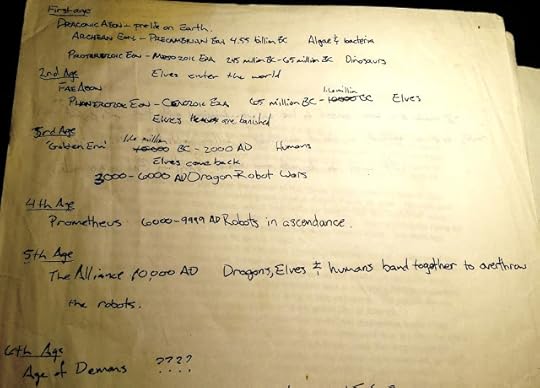
Information:
Setting:
Dragon (working title), is yet another story that takes place on an earth far into the future.
Ages:
There have been five ages of the world as the dragons see it. The first age was the age of dragons. In this time, dragons flourished, being the most powerful creatures in the world. This encompasses the beginning of life on earth—since, as everyone knows, dragons were the first creatures that populated the earth, arriving from out of the void and making the earth habitable for other living beings—until the end of the dinosaurs.
Beginning of life until 65 million BC.
During the second age came the arrival of the 'faery' people from the lands of Fae. Using their mystical powers, they created grand cities and beautiful landscapes. They became rivals to the dragons. The dragons, whose lives were far longer than the 'immortal' elves, chose to wait them out and descended into the bowels of the earth. Only occasionally rising to the surface to mate and view the toils and tribulations of the 'lesser' races. The third age lasted until the ice age.
65 million BC to 1.6 million BC.
In the third age, man—a result of the elves meddling with the natural creatures of the earth—came to power. Casting their former masters down, they banished them to the lands of the Fae using their own brand of magical power that drew on the powers of the Earth itself. The grand wizards of the humans created an impenetrable seal across the void that separated Fae and earth, sacrificing themselves in order to bring it into existence. The cosmic forces summoned by the magicians completely destroyed their grand city of Atlantis.
Left without their greatest minds and powerless to defend themselves against the natural forces of the world, man discovered technology and science, and thus the tool for their own destruction. In the beginning, when man was still relatively weak, the dragons often surfaced and tried to slow down the inevitable collapse of the human race; however, as the humans grew stronger and more intelligent, it became too dangerous for the dragons to interfere. Still, they persisted, determined that the humans would not destroy everything they had worked for. During this time, many dragons were killed trying to save the world. Finally, they gave up and reclined in the bowels of the earth, resigned to wait for the elves' creation to destroy everything so they may begin anew. This happened near the end of the ninth millennium of human civilization, or 5996 AD. Humans refer to the third age as the 'golden era,' a time when everything was good and they lived a life of ease.
1.6 million BC to 6000 AD.
During the fourth age, the mystical seal placed on the lands of Fae was weakened along with the earth after the cataclysmic sundering of the world. The creatures of Fae poured through the void into Earth, eager to reclaim a place for themselves after their one and a half million year exile. However, the humans' great civilization left behind a terrible legacy: the robots. Separately, the last remnants of the humans (whose magic was working again after the destruction of the seal of Fae), the elves, and the dragons fought against the robots at every opportunity. But it was not until they united that they finally destroyed the robots and completely wiped any and all traces of their existence off of the face of the earth. This happened in the year 9,999. With the new year, brought freedom from fear of the robots and the dawn of the fifth age.
The tenuous alliance between the races dissolved after the defeat of the robots. The 'barbaric' humans formed many isolated kingdoms all over the planet and their powerful magic kept the elves from enslaving them again, while the 'noble' elves created the beautiful city of Yesurian, and also had small communities around foci of the leylines of the earth. The dragons, refusing to be categorized as either 'barbaric' or 'noble' were simply themselves. Always having been solitary creatures, the dragons' grand kingdom, that had stood as a testament for good for literally billions of years dissolved around the same time as the collapse of the races' alliance. The dragons of the world scattered, never joining together again.
After many years and endless fighting, a king unites a tribe of humans with a village of elves. Thus begins a new alliance. The High King wins many battles and finally brings many lands under a tenuous peace. The dragons, all but vanished into obscurity are the powers behind the scenes.
However, the dragons, who were never social creatures, do not all agree. Some believe the lesser races should be wiped out. Some believe everyone should be equal. Some believe the lesser races should become slaves for the dragons. The ones in power believe in the Alliance, and that is why the High King is succeeding.
Always before in history, when there is a light, there is a shadow: the demons. Their goal is to begin a new age of darkness. Always they have been in the shadows, but now as they are in danger of being found out, they are taking chances. Never before has there been such a fine line between success and total failure.
There is a prophecy, billions of years old, that hints at the existence of the demons, and also hints at the existence of a hero to fight them. One who is both a dragon and not a dragon.
So there you have it. It might make sense to mention that originally the main character was going to be a dragon that was born while his mother was shapeshifted, promptly orphaned (because Conveniently an Orphan is one trope I find hard to leave behind even today), and forced into the wilds to grow up as a human that doesn't know his true heritage.
It was wayyyy too close to the Breath of Fire games for me to be comfortable with (in fact, since I was pretty into Japanese culture and was still pretty into the
Ryu's father became one of the main characters of the new series starting with Throne of Ao and his current existence is up in the air as I don't know what will happen to his father in upcoming novels and stories.
Thanks for reading! What did you think? Feel free to ask questions about changes between this original treatment and the WotA of now or about the aborted book detailing Ryu's coming-of-age.
I hope to be putting out some new (canonical) content in the WotA-verse soon, but I'm releasing a math section first (hopefully by the end of the month). Apologies if I've sent you down the rabbit hole of TV Tropes.org with the above links, but it's one of my favorite websites and something I think it's good to be cognizant of different tropes as a writer.
Also, if you have any experience or thoughts on Patreon and what you like to see from authors and creators on there, please share it with me. I am considering this as a platform moving forward.
My mom dropped off some old papers the other day and I had the time to go through them today. Hidden amongst them is one of the very first written treatments of what would become the setting for War of the Ages—written sometime around 2001-2003.
I thought it might be interesting to share—for my own personal history record if nothing else—so I made some minor edits for readability, but otherwise kept my mistakes—such as however the hell I counted the number of millenniums of human civilization and thinking that dinosaurs died out in 65 million BC instead of 65.5 million BC (note: none of this is officially canon anymore, but well, most of it actually is pretty close to the true setting. Why change a good idea, right?). Here's a snapshot of a written out timeline outline that was included with the treatment:

Information:
Setting:
Dragon (working title), is yet another story that takes place on an earth far into the future.
Ages:
There have been five ages of the world as the dragons see it. The first age was the age of dragons. In this time, dragons flourished, being the most powerful creatures in the world. This encompasses the beginning of life on earth—since, as everyone knows, dragons were the first creatures that populated the earth, arriving from out of the void and making the earth habitable for other living beings—until the end of the dinosaurs.
Beginning of life until 65 million BC.
During the second age came the arrival of the 'faery' people from the lands of Fae. Using their mystical powers, they created grand cities and beautiful landscapes. They became rivals to the dragons. The dragons, whose lives were far longer than the 'immortal' elves, chose to wait them out and descended into the bowels of the earth. Only occasionally rising to the surface to mate and view the toils and tribulations of the 'lesser' races. The third age lasted until the ice age.
65 million BC to 1.6 million BC.
In the third age, man—a result of the elves meddling with the natural creatures of the earth—came to power. Casting their former masters down, they banished them to the lands of the Fae using their own brand of magical power that drew on the powers of the Earth itself. The grand wizards of the humans created an impenetrable seal across the void that separated Fae and earth, sacrificing themselves in order to bring it into existence. The cosmic forces summoned by the magicians completely destroyed their grand city of Atlantis.
Left without their greatest minds and powerless to defend themselves against the natural forces of the world, man discovered technology and science, and thus the tool for their own destruction. In the beginning, when man was still relatively weak, the dragons often surfaced and tried to slow down the inevitable collapse of the human race; however, as the humans grew stronger and more intelligent, it became too dangerous for the dragons to interfere. Still, they persisted, determined that the humans would not destroy everything they had worked for. During this time, many dragons were killed trying to save the world. Finally, they gave up and reclined in the bowels of the earth, resigned to wait for the elves' creation to destroy everything so they may begin anew. This happened near the end of the ninth millennium of human civilization, or 5996 AD. Humans refer to the third age as the 'golden era,' a time when everything was good and they lived a life of ease.
1.6 million BC to 6000 AD.
During the fourth age, the mystical seal placed on the lands of Fae was weakened along with the earth after the cataclysmic sundering of the world. The creatures of Fae poured through the void into Earth, eager to reclaim a place for themselves after their one and a half million year exile. However, the humans' great civilization left behind a terrible legacy: the robots. Separately, the last remnants of the humans (whose magic was working again after the destruction of the seal of Fae), the elves, and the dragons fought against the robots at every opportunity. But it was not until they united that they finally destroyed the robots and completely wiped any and all traces of their existence off of the face of the earth. This happened in the year 9,999. With the new year, brought freedom from fear of the robots and the dawn of the fifth age.
The tenuous alliance between the races dissolved after the defeat of the robots. The 'barbaric' humans formed many isolated kingdoms all over the planet and their powerful magic kept the elves from enslaving them again, while the 'noble' elves created the beautiful city of Yesurian, and also had small communities around foci of the leylines of the earth. The dragons, refusing to be categorized as either 'barbaric' or 'noble' were simply themselves. Always having been solitary creatures, the dragons' grand kingdom, that had stood as a testament for good for literally billions of years dissolved around the same time as the collapse of the races' alliance. The dragons of the world scattered, never joining together again.
After many years and endless fighting, a king unites a tribe of humans with a village of elves. Thus begins a new alliance. The High King wins many battles and finally brings many lands under a tenuous peace. The dragons, all but vanished into obscurity are the powers behind the scenes.
However, the dragons, who were never social creatures, do not all agree. Some believe the lesser races should be wiped out. Some believe everyone should be equal. Some believe the lesser races should become slaves for the dragons. The ones in power believe in the Alliance, and that is why the High King is succeeding.
Always before in history, when there is a light, there is a shadow: the demons. Their goal is to begin a new age of darkness. Always they have been in the shadows, but now as they are in danger of being found out, they are taking chances. Never before has there been such a fine line between success and total failure.
There is a prophecy, billions of years old, that hints at the existence of the demons, and also hints at the existence of a hero to fight them. One who is both a dragon and not a dragon.
So there you have it. It might make sense to mention that originally the main character was going to be a dragon that was born while his mother was shapeshifted, promptly orphaned (because Conveniently an Orphan is one trope I find hard to leave behind even today), and forced into the wilds to grow up as a human that doesn't know his true heritage.
It was wayyyy too close to the Breath of Fire games for me to be comfortable with (in fact, since I was pretty into Japanese culture and was still pretty into the
Ryu's father became one of the main characters of the new series starting with Throne of Ao and his current existence is up in the air as I don't know what will happen to his father in upcoming novels and stories.
Thanks for reading! What did you think? Feel free to ask questions about changes between this original treatment and the WotA of now or about the aborted book detailing Ryu's coming-of-age.
I hope to be putting out some new (canonical) content in the WotA-verse soon, but I'm releasing a math section first (hopefully by the end of the month). Apologies if I've sent you down the rabbit hole of TV Tropes.org with the above links, but it's one of my favorite websites and something I think it's good to be cognizant of different tropes as a writer.
Also, if you have any experience or thoughts on Patreon and what you like to see from authors and creators on there, please share it with me. I am considering this as a platform moving forward.
Published on February 24, 2016 14:42
February 22, 2016
An aside on how I was taught to romanize Japanese
When I first started studying Japanese in an official capacity, I did it at the University of Pittsburgh. We had two "main professors" and a set of 5 or so native-Japanese speakers as graduate student instructors that switched off for our recitations (it was a 7-hours-of-class-a-week course). I don't really remember the main professors very well, but they were rather large proponents of the romanization used in "Japanese: The Spoken Language" by Eleanor Harz Jorden with Mari Noda.
A quick Google search reveals that this text has a LOT of detractors, and it's pretty frustrating to look back and think about how it's handicapped me.
But to the point, today I was watching a video made by a Japanese YouTuber and the word "eigo" flashed on the screen, to which I immediately interpreted as "English" and was pissed right the eff off because I had been imagining the word as "eego" for my entire adult life because of the stupid, stupid way this book romanizes Japanese.
This style of roumaji is apparently called the Nihon-shiki roumaji or 日本式ローマ字.
It's just stupid and it doesn't really make much sense.
What's the point of roumaji? Is it so that someone that reads the Latin alphabet can make an attempt to read or speak what it is they're reading? Because I sort of feel like that's the point. Am I wrong on this? Should the point be that no one can understand it on either side of the language?
So let's obscure the pronunciation of Japanese in an attempt for "purity" or whatever the flip the argument is for using it. I can't propose a single one.
Japanese doesn't have a single symbol for how Americans would say "tea" or how we would say "too". You might think they would, because hiragana/katakana is usually split up in categories of consonant + 5 vowels (ah, ee, ay, oh, oo—as an American would read them—and a, i, e, o, u as Japanese should), and there is a "t" category; but what this book would have you believe is that "ti" and "tu" exist as one would expect. They do not. "Ti" would be "CHI" if you ask anyone over the age of 5 in an English-speaking country to transliterate and "tu" would be "TSU'.
I broke myself of that absurd habit years ago (thankfully)—and to be honest, I'm pretty OK with hiragana/katakana, so when I see ち / チ or つ / ツ I am used to thinking "chi" and "tsu", but then there's this vowel lengthening nonsense the book advocates.
In Japanese, you basically pronounce everything. So e + i ("ay" + "ee") sounds like "ay" + "ee". But go ahead and try to say that. If you say it fast enough, it just sounds like a longer "ay". Similarly, your mouth makes an "oo" sound at the end of "oh", so to elongate "oh", you write o + u ("oh" + "oo").
This makes perfect sense and it's reflected in the hiragana: ei is えい and ou is おう, but again, this effed-up book would have you learn these as "ee" and "oo". Never mind that the English-speaking brain wants to interpret "ee" and "oo" as the vowels in he and food and not hay and toe, but it's not even what they should be in a direct translation of Japanese character for character!
Why hamstring the readers to do this?
Not to mention the deep-seated trauma caused to my understanding of Japanese in keeping the "y" sound for j-.
To write "ji", it's じ.
This is basically the only j- hiragana, so to get other vowels, you combine it with the hiragana for y-. When combined, the y- is dropped. So we get something that looks like "jyaa" but the "y" isn't pronounced and shouldn't be included in the roumaji. Ji + ya + a = "jaa" and is written じゃあ (notice the ya is smaller to indicate it's doing this vowel replacement thing), but the point here is that most of the other consonants don't do this. When you add ya to them in this manner, the "y" sound stays. So ki + ya is kya.
I still find myself writing out jyaa when I'm saying "see you later" which is bad, because it's so ingrained in my brain that I write it all the time. I regularly end conversations with jyaa. I've probably signed off on blogs that way in the past. You may have been like, "What a bloody moron this Zero kid is. He doesn't even know how to say goodbye in a language he used to be halfway competent in."
I feel like those students I sometimes get that were taught 5 ÷ 0 = 0 (spoiler: it's not).
It's also very frustrating that I have two college textbooks on Japanese and there's so much crap in them that they're effectively worthless.
Anyway, so yeah, why do we teach things that are counter to learning? Also, why do people (and by people, I mean teachers) think division by zero has an answer?
A quick Google search reveals that this text has a LOT of detractors, and it's pretty frustrating to look back and think about how it's handicapped me.
But to the point, today I was watching a video made by a Japanese YouTuber and the word "eigo" flashed on the screen, to which I immediately interpreted as "English" and was pissed right the eff off because I had been imagining the word as "eego" for my entire adult life because of the stupid, stupid way this book romanizes Japanese.
This style of roumaji is apparently called the Nihon-shiki roumaji or 日本式ローマ字.
It's just stupid and it doesn't really make much sense.
What's the point of roumaji? Is it so that someone that reads the Latin alphabet can make an attempt to read or speak what it is they're reading? Because I sort of feel like that's the point. Am I wrong on this? Should the point be that no one can understand it on either side of the language?
So let's obscure the pronunciation of Japanese in an attempt for "purity" or whatever the flip the argument is for using it. I can't propose a single one.
Japanese doesn't have a single symbol for how Americans would say "tea" or how we would say "too". You might think they would, because hiragana/katakana is usually split up in categories of consonant + 5 vowels (ah, ee, ay, oh, oo—as an American would read them—and a, i, e, o, u as Japanese should), and there is a "t" category; but what this book would have you believe is that "ti" and "tu" exist as one would expect. They do not. "Ti" would be "CHI" if you ask anyone over the age of 5 in an English-speaking country to transliterate and "tu" would be "TSU'.
I broke myself of that absurd habit years ago (thankfully)—and to be honest, I'm pretty OK with hiragana/katakana, so when I see ち / チ or つ / ツ I am used to thinking "chi" and "tsu", but then there's this vowel lengthening nonsense the book advocates.
In Japanese, you basically pronounce everything. So e + i ("ay" + "ee") sounds like "ay" + "ee". But go ahead and try to say that. If you say it fast enough, it just sounds like a longer "ay". Similarly, your mouth makes an "oo" sound at the end of "oh", so to elongate "oh", you write o + u ("oh" + "oo").
This makes perfect sense and it's reflected in the hiragana: ei is えい and ou is おう, but again, this effed-up book would have you learn these as "ee" and "oo". Never mind that the English-speaking brain wants to interpret "ee" and "oo" as the vowels in he and food and not hay and toe, but it's not even what they should be in a direct translation of Japanese character for character!
Why hamstring the readers to do this?
Not to mention the deep-seated trauma caused to my understanding of Japanese in keeping the "y" sound for j-.
To write "ji", it's じ.
This is basically the only j- hiragana, so to get other vowels, you combine it with the hiragana for y-. When combined, the y- is dropped. So we get something that looks like "jyaa" but the "y" isn't pronounced and shouldn't be included in the roumaji. Ji + ya + a = "jaa" and is written じゃあ (notice the ya is smaller to indicate it's doing this vowel replacement thing), but the point here is that most of the other consonants don't do this. When you add ya to them in this manner, the "y" sound stays. So ki + ya is kya.
I still find myself writing out jyaa when I'm saying "see you later" which is bad, because it's so ingrained in my brain that I write it all the time. I regularly end conversations with jyaa. I've probably signed off on blogs that way in the past. You may have been like, "What a bloody moron this Zero kid is. He doesn't even know how to say goodbye in a language he used to be halfway competent in."
I feel like those students I sometimes get that were taught 5 ÷ 0 = 0 (spoiler: it's not).
It's also very frustrating that I have two college textbooks on Japanese and there's so much crap in them that they're effectively worthless.
Anyway, so yeah, why do we teach things that are counter to learning? Also, why do people (and by people, I mean teachers) think division by zero has an answer?
Published on February 22, 2016 12:43



